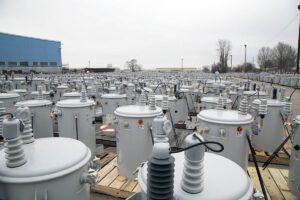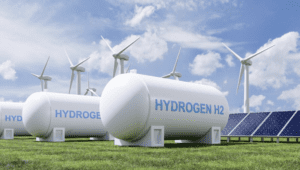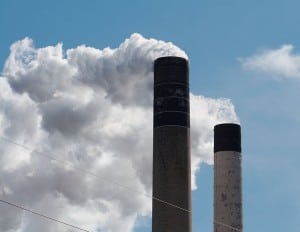EEI
-
Coal
Southern CEO: Data Center Demand, Regulatory Changes Could Keep Coal-Fired Units Online
Utilities recognizing the need to produce more electricity, in part to satisfy demand from data centers, may keep coal-fired units in operation longer than anticipated. A lessening of environmental regulations under the incoming Trump administration also means power generators are rethinking plans to retire their fossil fuel-burning facilities. Chris Womack, CEO of Southern Co., is […]
-
T&D
NVIDIA CEO: AI Will Impact the Future of Energy
The future of energy may depend on technology with roots in the video game industry, by a company founded more than 30 years ago that wanted to use accelerated computing to improve the look and feel of the gaming experience. Jensen Huang, NVIDIA’s CEO and president since co-founding the Santa Clara, California-based company in 1993, […]
-
Legal & Regulatory
DOE Eases Requirements in Final Transformer Efficiency Standards Amid Supply Chain Strain
The U.S. Department of Energy’s (DOE’s) final energy efficiency standards for distribution transformers appear to strike a compromise with industry, softening the agency’s stance on steel requirements for essential transformer components and extending compliance deadlines to five years. The DOE’s final standards issued on April 4 seek to reduce losses in three types of distribution […]
-
Hydrogen
Treasury’s Proposed Clean Hydrogen PTC Rule Disappoints Power Industry
The Department of the Treasury has released proposed regulations and guidance defining a tax credit for the production of “clean hydrogen,” a significant supply-side incentive that is part of the Biden administration’s larger climate-driven policy framework. But though long-awaited, the measure has stirred up strong disappointment from the power industry. If finalized, the Treasury Department’s […]
-
T&D
Improving the U.S. Electric Power Grid: Mitigating Vulnerabilities and Enhancing Operation
The U.S. power grid has many vulnerabilities, but power companies, with additional support from the government, are investing in the system and enhancing its operation through new innovative technology. The
-
Electrification
U.S. Power Sector Trade Groups Flag Critical Electrical Steel Crunch
Nine trade groups—including four representing the power sector—have urged the Biden administration to prioritize actions that support the domestic production of electrical steel, warning that shortages are contributing to “significant and persistent” supply chain challenges. The groups, which include the Edison Electric Institute (EEI), the American Public Power Association (APPA), the National Rural Electric Cooperative […]
-
Distributed Power
Reconsider Distribution Transformer Efficiency Standards, Power Groups Urge DOE
Three major electric power trade groups in a letter on Feb. 15 urged the Department of Energy (DOE) to reconsider proposed energy efficiency conservation standards for distribution transformers, citing “severe and ongoing supply chain challenges that have prolonged and complicated distribution transformer production and availability.” The letter was sent ahead of a public meeting scheduled […]
-
Water
Transformer Failures Disrupted Water Supplies in Houston For Nearly Two Days
A nearly two-day-long boil water order that shuttered schools and businesses and affected as many as 2.2 million customers in Houston—the nation’s fourth-largest city—was caused by a power outage stemming from the failure of two city-owned transformers. The incident began on Nov. 27 at 10:30 a.m. when “a ground trip and current overload” tripped the […]
-
Legal & Regulatory
Avoiding an ‘American Nightmare’—Cybersecurity Initiatives in the Power Sector
Cyberattacks on the U.S. energy system threaten our national security and way of life. While the sources of such risks may be debatable, the threats are real and the potential consequences are grave. Former
-
Environmental
EPA Retains Soot Standards; Drastic PM Reductions Already Achieved, Industry Says
In a significant but controversial final action, the Environmental Protection Agency (EPA) on Dec. 7 retained its existing National Ambient Air Quality Standards (NAAQS) for both fine and coarse particulate matter (PM2.5 and PM10). While the EPA said the decision came “after careful review and consideration of the most recent available scientific evidence and technical […]
-
Fuel
The Bittersweet Power of Hybrids
A quest for reliability and flexibility is driving significant interest in hybrid and co-located resources, but their widespread integration could hinge on how they are defined and valued in wholesale
-
Supply Chains
Mixed Reactions on Looming DOE NOPR for Bulk Power System Security
The Department of Energy (DOE) will issue a notice of proposed rule-making (NOPR) to implement President Trump’s broad bulk power system (BPS) security executive order (EO) “later this fall,” a DOE official confirmed to POWER on Oct. 5. Though the NOPR is delayed beyond the 150-day timeframe set by the EO, various BPS stakeholders are […]
-
Cybersecurity
Power Sector, Federal Entities Scramble to Close Supply Chain Security Gaps
Marking another major federal effort to address potential supply chain risks to the bulk power system (BPS), the Federal Energy Regulatory Commission (FERC) on Sept. 17 sought industry’s perspective on a number of important considerations, including possible actions the regulatory body could take to address security gaps. The U.S.-based power sector, meanwhile, has moved quickly […]
-
Legal & Regulatory
FERC Finalizes PURPA Rule Reforms
The Federal Energy Regulatory Commission (FERC) finalized a long-awaited rule revising regulations that govern qualifying small power producers and cogenerators under the Public Utility Regulatory Policies Act of 1978 (PURPA). While FERC said the rule was necessary to respond to significant market changes, the action drew mixed reactions from industry. FERC’s final rule issued on […]
-
COVID-19
NERC: Summer 2020 Reliability Rife With Unknowns
Despite COVID-19’s impact on power demand, disrupted pre-season generation preparation, and an expected highly active hurricane and wildfire season, industry appears well-positioned to meet peak demand this summer under anticipated weather in nearly all parts of the North American bulk power system (BPS). Other than in the Electric Reliability Council of Texas (ERCOT), anticipated reserve […]
-
Cybersecurity
NERC Moves to Defer Reliability Standards, Provide COVID-19 Flexibility
The North American Electric Reliability Corporation (NERC) has asked the Federal Energy Regulatory Commission (FERC) to delay the implementation of seven reliability standards that relate to cybersecurity, training, disturbance monitoring and reporting, generator relay loadability, and coordination of protection systems for performance during faults. In an April 6 filing to FERC, NERC noted the rules […]
-
News
Power Sector Resources for Coronavirus Pandemic Response
As part of POWER magazine’s in-depth coverage of the COVID-19 pandemic, its editors are curating a list of resources that may provide actionable information helpful to anyone involved in the world’s vast bulk power systems. Please write to editor@powermag.com if you know of additional resources that should be added to this page. POWER Magazine’s Live […]
-
Workforce
Power Industry Pleads for Priority COVID-19 Testing, PPE for Mission-Essential Workers
The U.S. power sector is rallying together to implore state and local governments to treat sector-wide “mission-essential employees” with higher priority and ensure they have top-level access to testing and personal protective equipment (PPE) amid the intensifying COVID-19 pandemic. In a four-page April 2 white paper presumably addressing federal leadership, the Electricity Subsector Coordinating Council […]
-
News
Electrification: Too Much of a Good Thing?
Electrification has been a much-touted driver for the global energy transition toward decarbonization. But though an all-electric future could have vast implications for the power and gas sectors, achieving it
-
O&M
ELECTRIC POWER Conference Postponed
The world has become a very different place over the past few months with the outbreak of a new coronavirus—COVID-19. The virus has forced travel bans and literal lockdowns in several countries. The NCAA and
-
Business
Utilities Plan to Keep Key Staff Housed at Power Plants
U.S. electric utilities and other energy companies are preparing to have key personnel remain at power plants and operations centers to ensure the facilities remain online during the coronavirus pandemic. The federal government considers power plants part of the nation’s critical infrastructure. The U.S. Department of Homeland Security (DHS) is responsible for working with power […]
-
News
Power Industry Weighs Impacts of Coronavirus
Utilities and power generators worldwide are altering their business practices and developing strategies for dealing with the COVID-19 pandemic. It’s particularly critical for the power industry, as a reliable supply of electricity is essential to prevent even more economic disruption. The U.S. Department of Homeland Security (DHS) lists utilities among the 16 industries that the […]
-
News
Energy Groups Make Plans to Deal with Coronavirus; EEI Issues Bulletin
The Edison Electric Institute (EEI), whose membership includes all investor-owned U.S. power companies, has told its members to prepare contingency plans for their operations due to the COVID-19 pandemic. Several U.S. grid operators already have announced measures designed to keep employees as safe as possible, while maintaining the reliability of the nation’s power supply. The […]
-
Connected Plant
FERC, NERC Want to Disclose Names, Penalties for Cybersecurity Reliability Violations
The names of bulk power system entities that violate federal critical infrastructure cybersecurity reliability standards—along with identification of standards violated and penalties assessed—may soon be routinely disclosed under changes proposed by the Federal Energy Regulatory Commission (FERC) and the North American Reliability Corp. (NERC). The proposed changes, which FERC and NERC outlined in an Aug. […]
-
Connected Plant
The POWER Interview: Navigant Navigates Changing Energy Landscape
The rapid evolution of the world’s power generation landscape is creating challenges for utilities and others in the energy space, as power plant owners and operators adapt to new technologies and changing business models. Jan Vrins, managing director and segment leader for Navigant’s global Energy practice, is immersed in this change. Vrins, who joined Navigant […]
-
News
Trump Acts on Critical Infrastructure Resiliency Against EMP Threats
President Trump has signed an executive order (EO) to boost coordination for and national resilience against electromagnetic pulse (EMP) threats—both from nuclear warfare and natural events like solar superstorms. The action suggests new federal mandates to protect critical infrastructure against EMP events and attacks may be on the horizon. Senior Trump administration officials from the National Security […]
-
News
Decarbonization, Electrification Key Among 8 Priorities for U.S. Investor-Owned Power Companies
In line with customer preferences, U.S. investor-owned electric companies are heavily invested in decarbonization and electrification, the Edison Electric Institute (EEI) told Wall Street analysts and bankers on Feb. 6. In its annual presentation to potential investors and industry observers, the trade association that represents U.S. investor-owned electric companies lamented a number of uncertainties affecting […]
-
Coal
As More Power Companies Announce Decarbonization Initiatives, EEI Makes Sustainability Reporting Easier
A spate of major power companies—including American Electric Power (AEP) and Southern Co.—have acquiesced to investor pressure and announced drastic cuts to their generating fleet carbon emissions over the long term. Industry group Edison Electric Institute (EEI) this week launched an official industry-designed template to help its member utilities better inform investors about their environmental, […]
-
Commentary
Electric Vehicles—Subsidies for an Environmental Pretender
On May 22, the Edison Electric Institute (EEI), the American Public Power Association (APPA), and two groups representing U.S. and foreign automakers sent a letter to Environmental Protection Agency (EPA)
-
T&D
Puerto Rico Power Restoration Effort a Focus of EEI Convention
The Edison Electric Institute (EEI), an industry association that represents all U.S. investor-owned electric companies, made a point during its annual convention of recognizing the mutual assistance workers who labored tirelessly to restore power to Puerto Rico following Hurricane Maria. Nearly 200 personnel, who had worked on the ground in Puerto Rico, gathered on stage […]




























